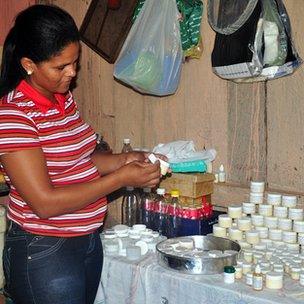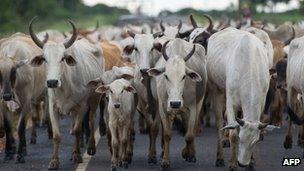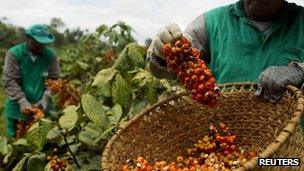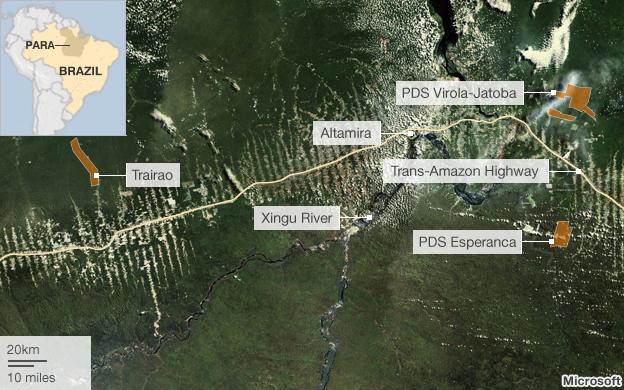Brazil settlers in land disputes over Amazon farming
- Published
.jpg)
Dedel (left) and his fellow farmers are trying to market their sustainable products
"This is the copaiba tree," said Derisvaldo Moreira, universally known as Dedel.
"Look how we made a nick in the tree, collected the oil and then blocked it up so the wound would heal."
Walking through the exuberant Amazon forest, Dedel pointed out the trees, including andiroba, Brazil nut, and cupuacu, from which his community extracts oil.
It is easy to think Dedel was brought up in the forest, relying on knowledge passed down the generations. But this is far from the truth.
Dedel and his family, like many others living in this region, migrated to the Amazon region from the drought-ridden north-east of Brazil.
They came in search of land and eventually got a plot under an ambitious government programme to settle thousands of families along the Transamazon highway.
In the 1990s, they practised slash-and-burn agriculture to plant subsistence crops and pasture for cattle.
But some families in Dedel's settlement, called Rio Trairao, began to realise that this kind of farming was exhausting the soil.
Beauty products
The settlers began to consider a new kind of economic activity.

The community wants to expand their use of natural products from the Amazon
Their idea was not to stop their old farming practices overnight but to combine them with the sustainable extraction of oil from the andiroba tree.
With the support of an energetic Roman Catholic nun, Sister Angela Sauzen, the Seeds of the Forest project was created. Since then, it has expanded to include more forest products and involve more communities.
The transition has not been easy. The settlers had to turn to older communities in the region to learn how to extract the oil. They had to go through the complex bureaucratic process of setting up a company, made all the more difficult because the agrarian reform institute, Incra, has still not recognised their right to the land.
They also had to conform to high technical standards to sell their oils to demanding beauty products manufacturers. Some of the families gave up, realising that it would take time to get a good financial return, but many remain enthusiastic.
Different aims
But the settlers' main problem has been the implacable opposition of big landowners and logging companies who lay claim to their land.
This is even though the government decided in 1971 that a 100km band of land on either side of the Transamazon Highway should be occupied exclusively by small farmers under the agrarian reform programme.
The loggers, who are the main economic force in the region, admit off the record that they are all to some extent operating illegally.

Brazil is a major agricultural exporter
This is partly, they say, because it is difficult to meet all the bureaucratic requirements covering their activities under Brazilian legislation.
Adair Abel Vargas, one of the biggest loggers in the region, said: "Incra didn't do what it promised. It gave the plots to the families but didn't build the roads they needed to reach them. It was us, the loggers, who built all the roads."
Using this power of patronage, the loggers have acquired great political power in the region. Today they believe that their dominance is being challenged by the families in Rio Trairao, who are proposing a new sustainable way of living off the forest.
The loggers' hostility towards Seeds of the Forest has grown in recent months because the settlers want the authorities to allow them to use another large area of forest adjacent to their settlement. This is an area regularly ransacked by the loggers.
Dedel said that loggers had warned them that they would be risking their lives if they pressed ahead.
"We haven't been intimidated," he said. "What really bothers us is the number of trees they're felling. When they began, it was one tree here, another 200m away.
"But now they're taking out all kinds of other less valuable timber - macaranduba, angelim vermelho, amarelao and so on. And when they go into the forest, they also damage a lot of the trees we need."
Farm wealth
Domingos Nicolodi is a cattle rancher who wants to take over 6,000 hectares of land exactly in the area the settlers are already using to collect forest products.

Guarana is an Amazon fruit that is already widely marketed
Although this would be more than the maximum area of public land that a single landowner can purchase under the Brazilian constitution, Mr Nicolodi was quite open about his ambitions.
He would put the land to good use, he said, by rearing cattle on it and contributing to the wealth the agri-business sector brings to Brazil.
When asked what he thought about the Seeds of the Forest project, he replied: "This is all the fault of that crazy nun. I don't know why she has to get involved in these land questions. She should stay in the church, praying."
Sister Angela shrugged off this criticism, saying that what was important was that Incra legalised the settlers' situation.
"We have repeatedly asked for urgent action", she said. "And while nothing happens, the forest is being emptied into the loggers' lorries."
Two irreconcilable visions of the future of the Amazon rainforest are competing here.
Some, such as the community of Trairao, are attempting to live off the forest, while preserving and enhancing its biodiversity for the future.
By contrast, there are those who believe that while some areas should be protected, the Amazon is a valuable resource that should be exploited, even if that means felling the trees.
The Brazilian government has passed tough environmental regulations about how land in the Amazon should be cleared but these are not being properly implemented, largely because there are far too few law enforcers on the ground.
For the moment, Sister Angela and Dedel feel very much on their own.

- Published29 November 2012
- Published27 November 2012
- Published25 May 2011
- Published11 June 2012
- Published19 June 2012
- Published2 January 2012